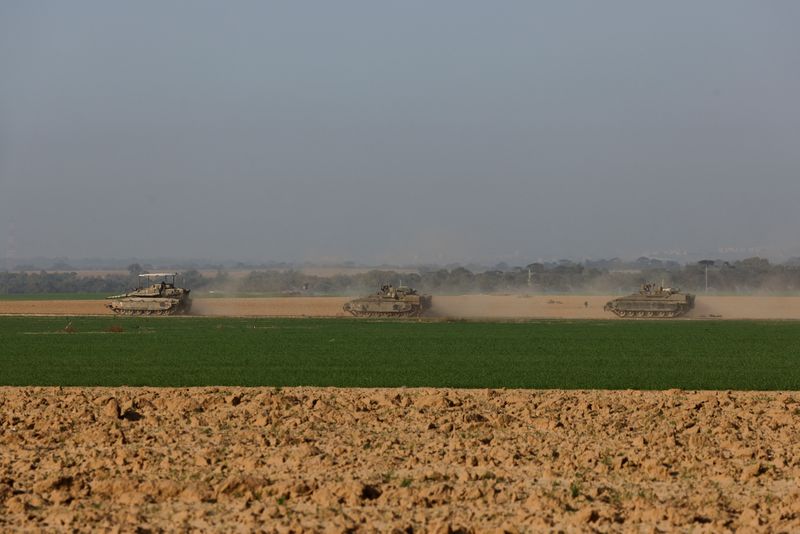By Simon Lewis, Humeyra Pamuk and Jeff Mason
WASHINGTON (Reuters) -The United States said on Monday it was too soon to make a final judgment on whether Israel was doing enough to protect civilians in Gaza despite some improvements and that it expected Israeli forces not to strike zones they have identified as safe.
Intense Israeli air strikes on Monday hit the southern part of the Gaza Strip, killing and wounding dozens of Palestinians, including in areas where Israel had told people to seek shelter, residents and journalists on the ground said.
Fighting between Israel and the Hamas Palestinian militant group resumed on Friday after a seven-day pause to exchange hostages and prisoners and deliver humanitarian aid.
U.S. officials, in public and private, have repeatedly urged Israel to minimize civilian casualties in southern Gaza because of the high toll incurred in northern Gaza military operations. Israel is retaliating for an attack by Hamas on Oct. 7 that Israel says killed 1,200 people and took about 240 hostages.
"It's too early to make a definitive assessment," State Department spokesman Matt Miller told reporters at a briefing when asked if Israel was heeding the U.S. advice.
"In the north ... you saw them ask, or order, more than a million people to move. We've seen a much more targeted request for evacuations here," he added, saying Israel had identified specific neighborhoods where they planned operations "rather than telling an entire city ... to vacate their homes."
"So that is an improvement on what's happened before. They have instructed them to move to areas that we know are deconfliction zones," he added.
U.S. AND ISRAEL DISCUSS POTENTIAL LENGTH OF WAR
In a sign Washington is worried about how safe such areas may be, White House national security adviser Jake Sullivan said the United States expected Israel not to attack them.
"They have also indicated that there are areas where there will be 'no-strike' zones, and in those zones, we do expect Israel to follow through on not striking," he told reporters.
Sullivan also said the United States and Israel had discussed how long the war with Hamas should continue, but he declined to share that timeline.
Israel's assault has laid waste to much of Gaza. The Gaza health ministry said at least 15,899 Palestinians, 70% of them women or under 18s, have now been killed in Israeli bombardments in eight weeks of warfare. Thousands more are missing and feared buried in rubble.
Last week, U.S. Secretary of State Antony Blinken told Israeli Prime Minister Benjamin Netanyahu during his latest visit to Israel that Israel's military operations in southern Gaza must not repeat what occurred in the north.
"What we mean by that we do not want to see the same level of civilian casualties, we do not want to see the same level of mass displacement," Miller said. The Israelis provided detailed briefings on their intent to avoid mass displacement and civilian casualties, he said.
"As the Secretary made clear, it's not just intent that matters, it's results and we're watching very closely," Miller said.

About 900 people have been killed, however, in Israeli air strikes since Friday, Gaza health authorities said.
Miller also said Washington has not seen evidence that Israel is intentionally killing civilians. Miller added that the U.S. government still expected civilian casualties. "That is sadly true of all wars," he said.